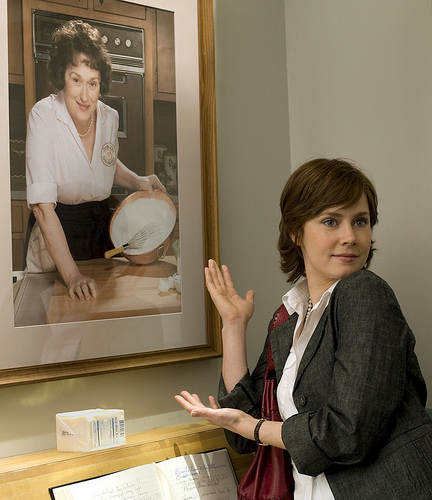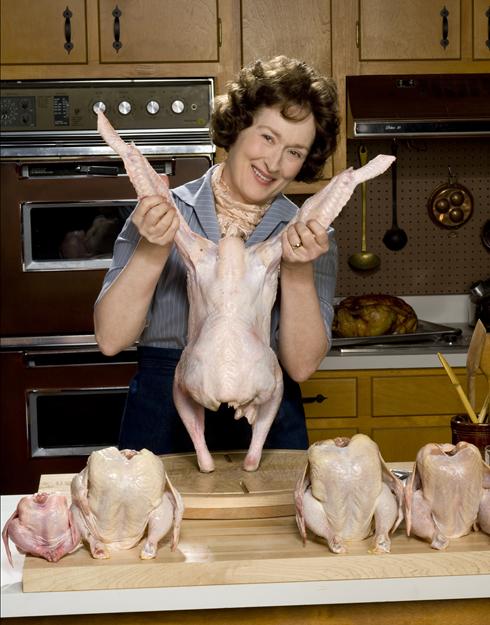Julie is about to turn 30. She's not a selfless person, but she works a selfless job, answering phones in a cubicle for the Lower Manhattan Development Corporation post-9/11. Like bleak shades of Charlotte, Miranda, and Samantha, her crummy friends from college torment her over tedious Cobb salad lunches, bragging about the money they make and the professional coups they score, pausing only to scream into cell phones at beleaguered assistants. A failed novelist, Julie also wants something to do, something more, something bigger for herself to give her purpose, an important project to complete -- because, in her mind, she's never been much good at that, the finishing of things.
The film doesn't sufficiently sell Julie's decision to blog about cooking her way through Child's celebrated book. That on-screen moment is weak, her impetus glossed over like ripples in a cake's frosting. Once Julie gets going, her resolve blossoms into a slightly creepy, worshipful obsession. Julia becomes her imaginary friend, a beacon guiding her through recipe after recipe, challenge after challenge, building and shaping her confidence. I start to become concerned when she dresses up like Child for her 30th birthday party, standing smartly before the gathered company, practically saluting, looking a little like a girl scout pretending to be a totalitarian dictator. She's mean to her husband, a sweet, easy-going guy with little cinematic heft. In a nod to gender roles, he kills lobsters when her hand falters, and willingly suffers through indigestion and his wife's marked disinterest in sex. Again and again, he tries to understand as she flies off the handle, frenzied and emotional, whenever a recipe goes wrong, when she's too whacked on gimlets to hear the timer, or, most memorably, when a stuffed chicken slides awkwardly off the kitchen counter and plummets to the floor in a heap of translucent muck, bone, and splattered forcemeat.

Slightly creepy, right?
This movie is about women's lives in transition, journeys unfolding across unfamiliar terrain. Even though food is not overly sensualized here, tastes only rarely poured over and described rapturously and richly, it's a movie dependent on the power of food, not just to galvanize our appetites and inspire the actors, but to spur on the characters they inhabit, to drive the narrative. In Julie's case, her love of food merely flickers in comparison with her pressing compulsion to broil, stew, and steam her way through the book, for the sake of the blog. When Julia cooks, she's on a journey in a purer sense, without a fixed deadline, only fretting over the fruits of her labor once they've slid into view. Cooking is passion for her, as wild and satisfying as sex, to which she doesn't hesitate to draw parallels. "These damn things are as hot as a stiff cock," she bursts out giddily in Streep's best Child-ese, as she juggles a piping hot cannelloni. At both discoveries, her joy bubbles over in ribald exaltation, whereas Julie, while acknowledging Child's chronicled passion, both in the kitchen and with Paul, the "butter to [her] bread", is too busy counting down the chapters to approach her journey with a similarly holistic vigor.
I didn't love the movie, but it was wonderful to see Child rendered so Child-like by a great actress, especially pre-fame, many decades away from becoming the quirky, charming old lady I grew up watching spar with Jacques Pepin every Saturday morning. By comparison, the Julie sequences sink like leaden quenelles. They simply prove a point: in this story, or gathering of stories, recipes are vessels. Over the course of the film, three different characters -- Julie, Julia, and Judith Jones, Child's first publisher -- make boeuf bourguignon. The same recipe comes to life in different kitchens, under different circumstances. Everyone who cooks it owns a memory of it; each individual effort passing through the recipe as if it were a conduit of experience. As many millions of cookbook owners can attest, Julia Child, or more accurately, what she represents, is a moveable feast. "I have conversations with her when I cook," says Julie, and she's right. Following a recipe is like having a conversation with convention across time and, maybe, depending on how crazy you are, the person who devised it. Like aspics, recipes can be shaky propositions; they're not infallible. For a variety of reasons, they don't always work the way they're supposed to; they require the flexibility, improvisation, and intuition only continued evolution through personal experience can provide.
Julie despairs when, on the precipice of major media triumph, she finds out the real Julia, not the clucking, whisk-brandishing fairy toque-mother of her fantasies, thinks less than highly of her blog. I'm not surprised; the idea of blogging alone probably couldn't bridge that multi-generational gap, though Child's purported sentiment has been echoed, unjustly or not, by many of Julie's blogger contemporaries. In the movie, Julie describes blogging as "yelling into the void." She goes from wondering if anyone is reading at all to worrying about what to write because so many people are reading. "Julie & Julia" is the first movie I've seen with a built-in blogging debate: are people who share their personal lives online inherently narcissistic and self-indulgent? Are they disingenuous? Are they presumptuous, like some stuffy twit way back in the pre-Internet era, dutifully keeping a diary with the idea it'll later be pored over by fascinated contributors to the New York Review of Books?
What if Julia Child had fallen for Chinese food when she lived there just a few years before moving to Paris? Would American housewives have had to come to terms with "Mastering the Art of Mandarin Cooking," "Handling Hunan," or "Szechuan From Scratch"? Might Julie be a directionless, dissatisfied San Franciscan, sequestered in the far reaches of the Richmond District, dashing down Clement Street in search of exotic ingredients, pondering Child's secrets to a sublime Shanghai soup dumpling?

